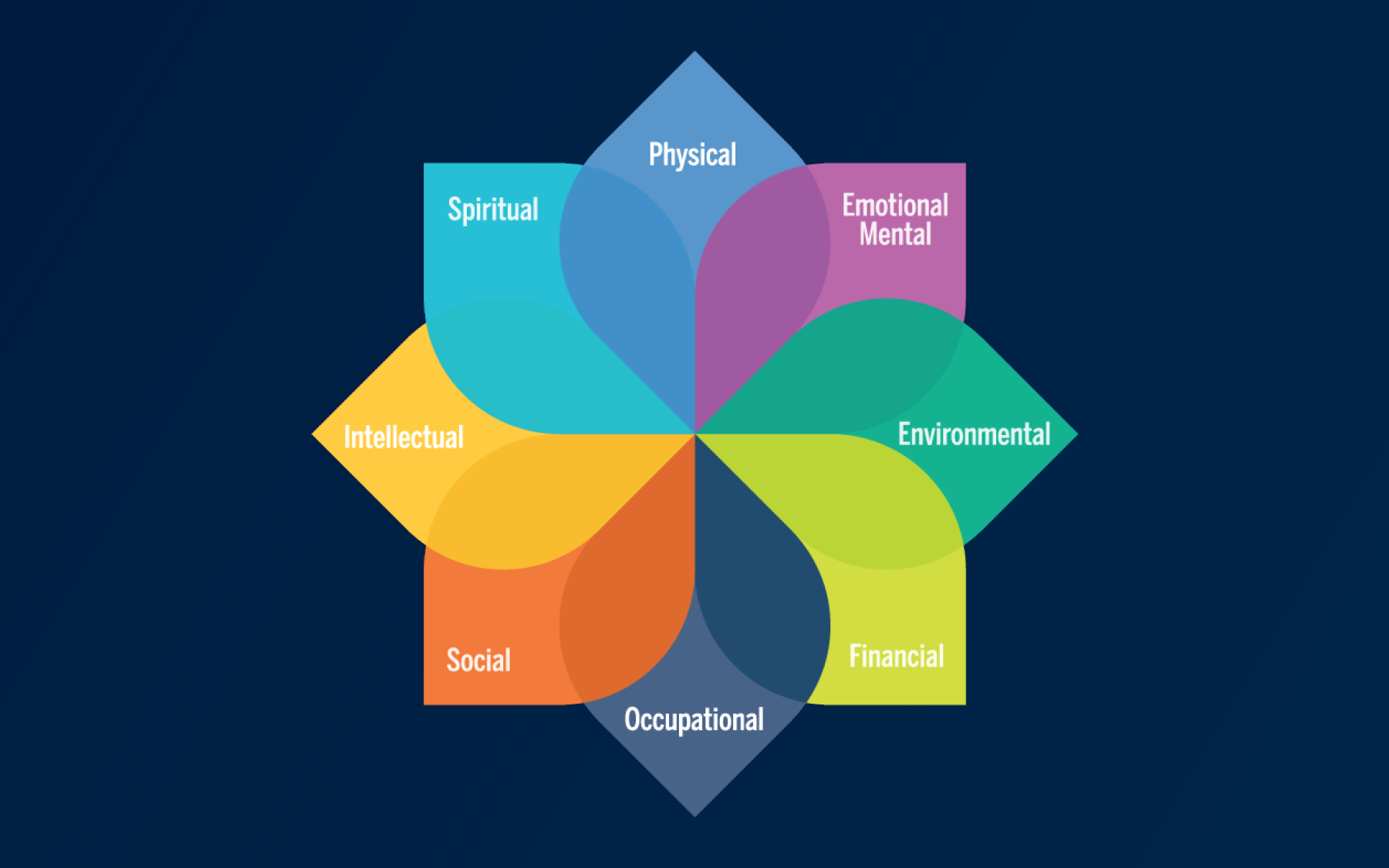While Rackham’s Well-Being Advocate Program works with faculty and staff in academic departments to provide support for graduate student mental health and well-being at the program level, the University of Michigan has advice for all of us to consider as we prioritize mental health and well-being as individuals.
“There are roughly eight dimensions to well-being: physical, emotional/mental, environmental, spiritual, financial, occupational, social, and intellectual,” says Rackham’s Well-Being Advocate, Elizabeth Rohr.
This model for understanding and talking about well-being is part of a campus-wide approach led by the Well-Being Collective at the university, a collaborative effort focused on making U-M a better place to live, work, and learn for U-M students, faculty, and staff.
When considering the U-M model for well-being, Rohr encourages the Rackham community to appreciate the “overlap” between each petal of the well-being flower.
“Although we may think of each dimension as separate or distinct from one another, they are very much connected and interconnected to whole-person well-being,” she says.
Well-Being Tips

Using the eight-dimensions model, Rohr offers the following tips for individuals prioritizing their own mental health and well-being:
- Practice compassion
Dimensions: Emotional/mental, spiritual, social, environmental, occupationalPracticing compassion involves cultivating a deeper awareness of the well-being of others. It goes beyond feeling empathy or sympathy; it involves a genuine desire to alleviate the suffering of others and promote their happiness and flourishing. Some important parts of practicing compassion include a non-judgmental attitude, acts of kindness and generosity, active listening, forgiveness, and self-compassion.
- Build your network, cultivate community
Dimensions: Intellectual, social, occupational, emotional/mental, financialBuilding and cultivating community is the intentional and ongoing work of creating and sustaining personal and professional/academic connections that foster mutual growth, respect, and whole-person well-being.
- Mindset shift: Reimagine and redefine what success means to you
Dimensions: Emotional/mental, occupational, social, intellectualLet’s open ourselves to a less one-size-fits-all definition of success, and a more expansive idea of what accomplishment can look like—one in which personal happiness, satisfaction, and thriving relationships are equally important and valued (maybe more so) than the more traditional markers of achievement.
- Stay connected!
Dimensions: Social, emotional/mental, intellectual, spiritual, physicalIt is so important when feeling busy and overwhelmed to stay connected with others and the things that matter to you most, even when you can’t give them your full attention.
- Take a break
Dimensions: Physical, mental/emotional, social, occupationalOne of the hardest things to do when busy is taking a traditional “break.” Yet, many of us unconsciously engage in activities like scrolling through our phones, shopping online, or playing a video game for moments of respite. Breaks don’t always have to involve a walk, or going to the gym, or cooking a meal, although these are all beneficial too. Sometimes, consciously recognizing the ways we naturally pause and recharge through activities can help us regain energy, sharpen our focus, and gain valuable perspective during hectic periods.
Importantly, Rohr encourages a gentle approach to tending to each dimension of well-being, leaving “all or nothing” thinking at the door.
“We can’t address every dimension, every day, all of the time, but understanding that each piece plays a part in our ability and our capacity to show up for ourselves and for others is an important first step.”
Well-Being Collective at the University of Michigan
Well-Being for Students
Rackham’s Well-Being Advocate Program
Rackham’s GradWell Podcast

